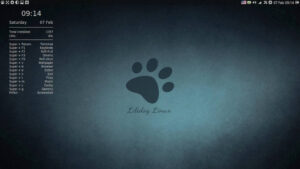When most people think about working with or trying out the Raspberry Pi, they are usually envisioning using Raspbian. This isn’t by default, but rather because Raspbian is the only OS available for the Raspberry Pi that comes equipped with the tools that we all hear about such as Scratch, Sonic Pi, and support for using the GPIO pins. That’s all changed now with the latest release of Ubuntu MATE for the Raspberry Pi 2.
 In this latest release, Ubuntu MATE now comes equipped with everything under the hood that Raspbian has to offer and then some. I’ll review some of the best parts about Ubuntu MATE and show why you might want to install Ubuntu MATE instead of Raspbian. One thing to note: I was using a Raspberry Pi 2 Model B and a SanDisk 16g micro SD card during testing.
In this latest release, Ubuntu MATE now comes equipped with everything under the hood that Raspbian has to offer and then some. I’ll review some of the best parts about Ubuntu MATE and show why you might want to install Ubuntu MATE instead of Raspbian. One thing to note: I was using a Raspberry Pi 2 Model B and a SanDisk 16g micro SD card during testing.
- Size – I would say that this is becoming the new norm for Raspberry Pi images, but then again, Ubuntu MATE is a fully fledged OS. The size of the image is right at 4 gigs, so using a 4GB or greater microSD card is a must. One thing that helped alleviate the size issue was to reformat the microSD card to allow Ubuntu MATE to use the entire space. Since Ubuntu MATE does not have the configuration screen that Raspbian has, I installed GParted and formatted the microSD card.
-
Speed – I was pleasantly surprised by the overall speed of Ubuntu MATE. Boot time was extremely fast, but so is the boot time for Raspbian. While we are talking about the boot process, Ubuntu MATE does not come with a default user like Raspbian. However, there are easy to follow steps on how to create a user during the initial install.
What I mainly noticed that was different from Raspbian was the overall speed and performance when going from one application to another. I’ve experienced issues with Raspbian locking up when starting LibreOffice or accessing the Internet, which was never the case with Ubuntu MATE. I was able to soar from one application to the next without noticing much lag and was extremely pleased with the performance when surfing the Internet.
-
GPIO Support – In the past, one of the biggest things that lead me to always choose Raspbian over Ubuntu MATE was GPIO support, which I’m happy to say Ubuntu MATE now has. I tested it by running several low-level experiments with some LEDs, buttons, and a breadboard, and every experiment worked correctly. I also installed the latest implementation of GPIO Zero, and it worked as well.
This latest release also brings an updated Python library, so not only is GPIO support available, but so is support for the picamera, Sense HAT, and Astro Pi.
-
Applications – Key applications in Raspbian not traditionally found in Ubuntu MATE have also been brought over. Sonic Pi, Scratch, and Minecraft all now come by default on Ubuntu MATE. Equally, Ubuntu MATE has long had applications that Raspbian is just now introducing, such as LibreOffice and Firefox as the default browser, versus Epiphany which comes with Raspbian.
-
Config menu – This is one area where Raspbian is still leading. Currently, there is not a config menu for Ubuntu MATE, which comes by default with Raspbian. This is not to say you cannot customize the configuration for Ubuntu MATE; it’s just that you might have to apply a bit more elbow grease than with Raspbian. There is some bright light here: A config menu for Ubuntu MATE has been slated for a future release.
To be fair, Ubuntu MATE has always been and will always be a full fledged distro while Raspbian was introduced as the initial OS for the Raspberry Pi. While Raspbian has made strides to become more of a legitimate desktop OS with its latest release of Jessie, it still has a way to go before it reaches that point.
Ubuntu MATE’s first release for the Raspberry Pi showed that it could perform quite well in the ARM arena but was missing key components, which made it a second choice to Raspbian. Now all that’s changed. With Ubuntu MATE’s latest release, it now appears Raspbian has some serious catching up to do. If you are currently using Raspbian on the Raspberry Pi 2, then do yourself a favor and try Ubuntu MATE.
Help keep FOSS Force strong. If you like this article, become a subscriber.
In addition to hosting a Raspberry Pi meetup in Washington D.C., Isaac Carter is a co-host on mintCast. He’s also a software engineer who enjoys working with Java, JavaScript, and GNU/Linux. When he’s not coding, you can find him reading on any number of subjects or on the golf course.







